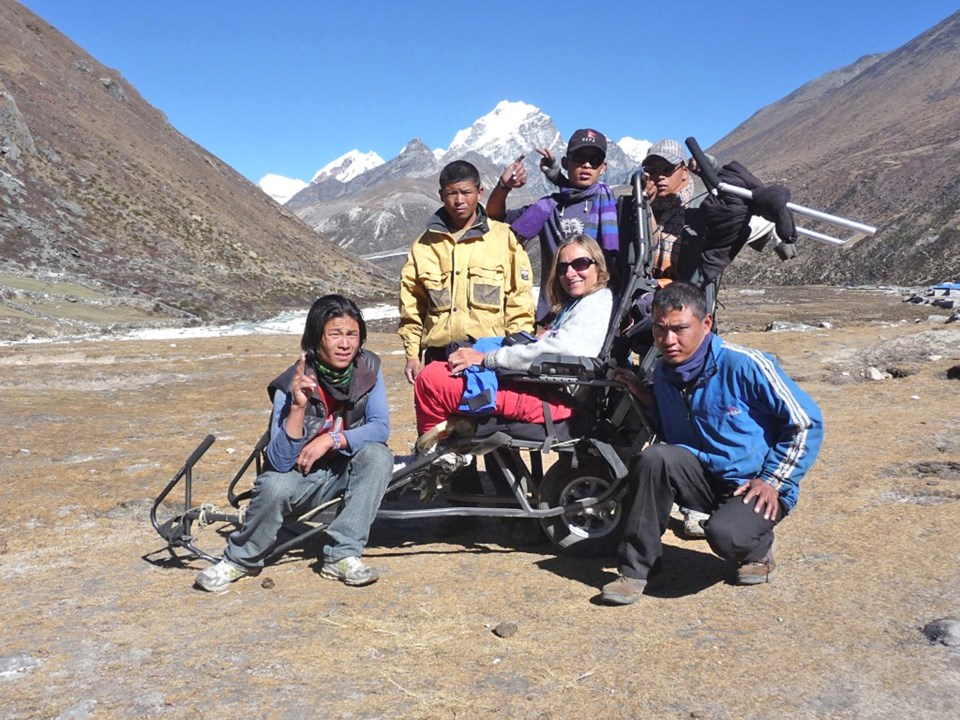"Don’t let the wheelchair fool you; that wheelchair doesn’t stop her from doing anything.”
That’s how New Westminster’s Linda McGowan was recently introduced to a new employee at one of the many community groups she works with as HandyDart’s access manager.
It’s not true, of course; the chair does stop her from doing things – and there was a time the disease that put her into it stopped her dead in her tracks.
In 1983, just before her 35th birthday, a few months after running the Vancouver marathon, the energetic nurse and mother of two was taking time off work and a master’s degree she was working on to drive to Disneyland with her family.
Riding in the passenger seat, feet on the dash, she reached down to pick something off the floor when she felt a shock like a hot wire travel down her back.
She would soon learn it was called Lhermitte’s sign – often among the first symptoms people bring to their doctors before being told they have multiple sclerosis (MS).
“I was a basket case,” McGowan said of her diagnosis not long after the Disney trip. “I just cried all the way home.”
It would be two more years before even her parents knew she had the disease, but as a home-care nurse, McGowan knew what she was up against from day one.
“I had never seen anybody who could live a life with MS,” she said. “As a home-care nurse, I only went in to see people who needed a nurse at home because they couldn’t get out. I couldn’t believe that there was any other option. I was shattered.”
Her moment of truth came six years after her diagnosis, when she had nearly lost the ability to walk.
One dark, rainy Friday in February, she came home from work and holed herself up in her basement suite alone to think.
“By Sunday night, I had decided that I only had two choices: to sit at home and moan and groan that life was not fair or to take what I had and do what I could with it.”
The next day, she booked herself a ticket to Beijing to fulfill a longtime dream of walking on the Great Wall of China, and by Friday she had bought her first wheelchair.
“I thought, if I get to China, and I have to walk three-quarters of a mile to get to the Great Wall, I won’t be able to walk on it,” she said.
Since that weekend, McGowan hasn’t looked back, travelling the globe, ready to take on whatever challenges each new country presents to her and her chair.
In the Himalayas, she rode in a basket on a porter’s back. In India, a few rupees bought her manual hoists onto wheelchair-inaccessible rail cars.
She has mingled with emperor penguins on the Falkland Islands and gotten up close and personal with elephants in Tanzania, seen the great pyramids in Egypt, Sugarloaf Mountain in Brazil, the Great Barrier Reef, the Taj Mahal and the Tower of London.
“Sometimes I have two or three plane tickets in my drawer,” she said.
She travels on the cheap, booking trips in the off seasons and staying in hostels and guesthouses.
“I put away some money every month. It’s my travel fund. It’s untouchable for anything else,” she said.
So far, besides some lost luggage, some things stolen from her at airports and the occasional time border guards have taken apart her chair during a search and then handed it back to her in pieces, McGowan has returned from her trips unscathed, but she knows she’s vulnerable.
“It’s one thing to be a woman travelling alone; it’s another to be a woman in a wheelchair travelling alone,” she said. “You have to be able to feel the fear and do it anyway.”
Why?
McGowan said she feels a responsibility, as a person with a disability, to educate people at home and around the world through her travels.
Toward that end, she has written a book that will launch this Sunday: Travelling the world with MS … in a Wheelchair, a collection stories from McGowan’s travels.
“My whole goal in writing this book is to motivate people with or without a disability to embrace their dreams, to get off the couch and to look at what they can do, not what they can’t do, to look at their ability, not their disability,” she said.
Travelling the world with MS … in a Wheelchair launches in Vancouver at the Blusson Spinal Cord Centre (818 West 10th Ave.) on Oct. 26 from 4 to 7 p.m.
Admission is free. To register, visit eventbrite.com.
For more information on McGowan’s travels, visit www.lindamcgowan.ca.



